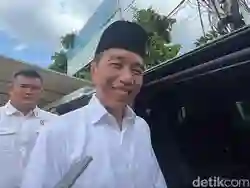Sekjen PDIP, Hasto Kristiyanto, in a case related to obstructing the investigation of alleged bribery involving suspect Harun Masiku, claimed to have received threats of being charged if the party expels the 7th President of Indonesia, Joko Widodo (Jokowi), from PDIP. President Jokowi firmly denied Hasto’s statement.
Allegations and Denial
-
Incident: Hasto made these statements while reading a note of objection in the Jakarta Corruption Court on Friday, March 21. He stated that he had been facing intimidation since August 2023 until the period after the 2024 regional elections.
-
Peak Intimidation: Hasto claimed the peak of the intimidation was when PDIP expelled Jokowi, linking the decision to attempts to pressurize him and PDIP in relation to the Harun Masiku case. He cited media monitoring showing a correlation between the case and PDIP’s critical stance.
-
Pressure and Threats: Alleged pressures, including officials asking him to resign as PDIP’s Secretary-General and not expel Jokowi, continued through the investigation stages. Hasto claimed he was threatened to be named a suspect, which allegedly materialized on Christmas Eve 2024, following Jokowi’s expulsion.
Response and Legal Issues
-
Legal Pressure: Hasto also criticized the Corruption Eradication Commission (KPK), stating that using legally binding court decisions as the basis for allegations was untrustworthy, citing similar pressures on other political parties.
-
Criminal Charges: Hasto stands accused of bribing former KPU Commissioner Wahyu Setiawan with Rp 600 million. The bribe was allegedly to facilitate the replacement of a DPR member, Harun Masiku, during the 2019-2024 period.
President’s Response
-
Jokowi’s Stance: President Jokowi refuted Hasto’s claims of threats linked to Jokowi’s expulsion from PDIP, questioning the logic behind such accusations during a meeting in Sumber, Banjarsari, as reported by detikJateng on Thursday, March 27.
-
Jokowi’s Advice: Having been expelled from PDIP himself a few months earlier, Jokowi remained nonchalant and advised a more logical approach, questioning the motives and benefits of such threats.

 Staf Kemenkum Dicatut Menjadi Pengurus IKA PMII di Pimpinan Fathan Subchi
Staf Kemenkum Dicatut Menjadi Pengurus IKA PMII di Pimpinan Fathan Subchi